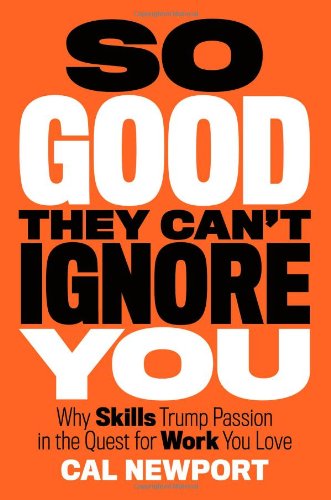Book Review: So Good They Can't Ignore You
In 2005, when I was a penniless grad student, I worked the maximum allowed (for foreign students) 20 hours each week to pay for rent and groceries. These paid $6 to $10 per hour and consisted of repetitive labor-intensive work: restacking library books, grading assignments, serving food, and so on.
During those long hours I often wondered, sometimes with a jealous tinge, what my fully-sponsored classmates knew or did that was worth $15,000 a semester of tuition plus $3,000 a month of stipend. That was a king’s ransom! What’s worse, I was smarter than most of them! (Did I mention I was very naive back then?) It felt really unfair.
You see, I was raised to believe that if you’re smart, and you study hard, get good grades… magically, the world will reward you.
It took me time to figure out that academic grades and IQ aren’t correlated to earnings. What’s more, the rewards aren’t linear either. Top performers in every field earn exponentially more than their average counterparts.
That knowledge helps me see the salary-related debates of recent years in better light. Do CEOs get overpaid? Is the minimum wage too low? It depends.
First off, you have to think of these things as market-driven. There’s no “grand conspiracy to make the rich richer and the poor poorer.” These are individual actors trying to maximize their returns in their particular supply-and-demand situation. A famous CEO can demand the highest compensation that the market of CEO-seeking companies is willing to bear. In the same way, a local McDonald’s or WalMart manager can find someone in the market of job-seekers willing to do the job for the least money.
Collectively this ends up looking like injustice - but that’s just a convenient narrative. It’s like the #OscarsSoWhite phenomenon - I don’t believe the individuals picking Oscar winners are racist; but as an overwhelmingly white group, the issues most relevant to them tend to be similar - and as a result the collective outcome skews a certain way.
You can’t change collective outcomes by blaming/shaming individuals - at least, not for the long run.
You have to change outcomes by changing the underlying market forces, the supply-and-demand conditions that result in #OscarsSoWhite or #FightFor15.
Secondly, it is upon you to understand your particular supply-and-demand situation. If you feel it’s unfavorable, it is upon you to change the equation in your favor - whether by learning new skills, changing geographies or industries, whatever.
Finally, the way to improve your market demand is, paradoxically, to not care about the financial aspect at all. Instead, focus on building valuable skills. Create something valuable in the world, and do the most good with it - and the rest will follow.
If I could go back to 20-year old me, or go forward 10 years to teach my kids anything, I would tell them this:
- Have a craftsman mindset - focus on skills, not passion
- Build your career capital
- Carve a niche in the world
- Become so good they can’t ignore you
In short, I would give them this book by Cal Newport:

Note: this is part of my 2016 reading list. Check out the complete list here.
